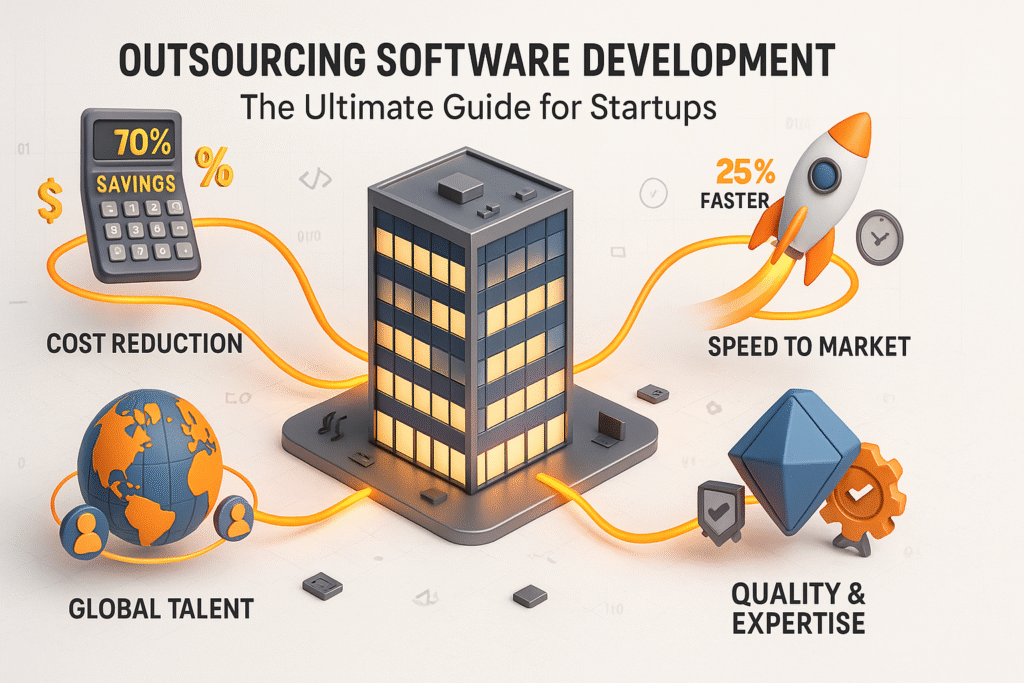Launching a successful startup requires making strategic decisions that maximize resources while maintaining quality and speed to market. Outsourcing software development has emerged as one of the most effective strategies for startups to access world-class talent, reduce costs by up to 70%, and accelerate time-to-market by 25% compared to building in-house teams. In today’s competitive landscape, 70% of businesses worldwide now outsource some form of IT services, with software development being among the most outsourced areas. For startups specifically, this trend represents more than just cost savings—it’s a pathway to innovation, scalability, and sustainable growth in an increasingly digital world.

Outsourcing Software Development
What is Software Development Outsourcing?
Software development outsourcing involves partnering with external companies or specialized teams to handle your software creation tasks, from initial concept through deployment and maintenance. Rather than building an internal development team from scratch, startups can leverage the expertise of established software development firms to bring their vision to life. This approach has evolved significantly beyond simple cost reduction. Modern outsourcing focuses on value-driven engagements that prioritize quality, innovation, and strategic partnership. Companies now view outsourcing as a way to access specialized skills, adopt cutting-edge technologies, and maintain flexibility in an uncertain business environment.
Three primary outsourcing software development models serve different startup needs:
Project-based outsourcing involves handing over complete projects to external teams who manage everything from development to delivery. Staff augmentation integrates external developers into your existing team to fill specific skill gaps. Dedicated teams provide you with a committed external team that works exclusively on your projects while maintaining close alignment with your business objectives. The choice between these models depends on your startup’s specific requirements, management preferences, and long-term strategic goals.
Why Startups Choose to Outsource Software Development?
Startups face unique challenges that make outsourcing software development particularly attractive. Budget constraints top the list, as 59% of startups cite cost reduction as their primary motivation for outsourcing. However, the benefits extend far beyond financial considerations.
Access to global talent addresses one of the most pressing challenges facing startups today. With the U.S. Bureau of Labor Statistics projecting a 22% growth in demand for software developers by 2030, the talent shortage has created intense competition for skilled professionals. outsourcing software development opens doors to a worldwide network of specialists with expertise in specific technologies that may be difficult to find locally.
Speed to market represents another critical advantage. The first-mover advantage can be decisive for startups, especially in competitive niches. While building an in-house team can take months and involve extensive paperwork, outsourcing allows you to sign a contract and immediately start working on your product. Studies show that hybrid in-house/offshore teams can deliver MVPs up to 7 weeks faster than purely internal teams.
Reduced management burden frees startup founders to focus on core business activities like refining their product vision, building their brand, and attracting users. Instead of spending time recruiting, training, and managing a development team, you can partner with an experienced outsourcing company that already has established processes in place.
Risk mitigation through outsourcing helps startups avoid common pitfalls like hiring the wrong developers or experiencing delays due to internal team turnover. Established outsourcing partners bring proven methodologies, quality control processes, and backup resources that reduce project risks.
Top Benefits of Outsourcing Software Development for Startups
Dramatic Cost Savings:
Benefits of outsourcing software development start with substantial financial advantages. Startups can save 30-70% on development costs compared to hiring full-time employees. These savings stem from eliminating salaries, benefits, office space, and infrastructure costs associated with in-house teams. The financial impact is particularly significant when considering total compensation packages. The median annual salary for an experienced software developer in the U.S. is $210,000, while outsourcing to regions like Eastern Europe, India, or Latin America can reduce costs by 50-70% while maintaining high quality.
Accelerated Time-to-Market:
Benefits of outsourcing software development for startups can reduce time-to-market by up to 25%, providing a crucial competitive advantage. External teams can hit the ground running without the lengthy onboarding and training periods required for new hires. The average time to ship a first software release is approximately 12 weeks with an outsourced team versus 19 weeks with an in-house team. This acceleration comes from accessing teams with established processes and methodologies, often including 24/7 development cycles across different time zones. Companies report that outsourcing cuts onboarding time by about 25% compared to assembling an internal team.
Access to Specialized Expertise:
Modern software development requires expertise in rapidly evolving technologies like artificial intelligence, machine learning, blockchain, and cloud computing. Benefits of Outsourcing software development for startups provides immediate access to specialists in these cutting-edge fields without the time and cost of developing internal capabilities. Reputable outsourcing companies invest heavily in staying current with the latest technologies and best practices. They often have experience across multiple industries and can bring valuable insights from similar projects to enhance your product development process.
Enhanced Scalability and Flexibility:
Startups need the ability to quickly scale their development capacity up or down based on changing requirements and market conditions. Outsourcing partnerships offer flexible models that allow you to adjust team size and expertise without the financial and logistical challenges of hiring or laying off employees. This scalability is particularly valuable for startups experiencing rapid growth or seasonal fluctuations in development needs. You can easily expand your team for major feature releases and scale back during maintenance periods.
Improved Focus on Core Business:
By delegating technical development tasks to external experts, startup founders and internal teams can concentrate on strategic activities that directly impact business growth. This includes product strategy, user experience design, market research, customer acquisition, and business development and 93% of companies that outsource report positive outcomes, citing not only cost and time savings but also reduced management stress and improved ability to focus on core competencies.
Common Challenges and Proven Solutions:
While outsourcing software development offers significant advantages, startups must navigate several potential challenges to ensure success. Understanding these obstacles and implementing proven solutions can make the difference between project success and failure.
Communication and Cultural Barriers:
Poor communication represents the leading cause of outsourcing project failures, with 80% of failed projects citing communication issues as a primary factor. Time zone differences, language barriers, and cultural misunderstandings can create significant obstacles to project success. The solution is Establish clear communication protocols from the beginning. Use project management tools like Slack, Asana, or Jira to maintain transparent communication channels. Schedule regular video conferences that accommodate both time zones, and document all decisions and requirements thoroughly. Choose partners with strong English proficiency and cultural alignment with your business values.
Quality Control Concerns:
Poor software quality costs U.S. companies $2.42 trillion annually, making quality assurance a critical concern for outsourced projects. Subpar code can lead to system failures, security vulnerabilities, and expensive post-deployment fixes that can be up to 100 times more costly than addressing issues during development. The Solution is Implement rigorous quality assurance standards and communicate them clearly to your outsourcing partner. Establish detailed testing protocols, code review processes, and performance benchmarks. Choose partners with proven QA methodologies and certifications in quality management systems.
Intellectual Property Protection:
Data security and intellectual property protection remain top concerns for startups considering outsourcing. The risk of sensitive information exposure or IP theft can have devastating consequences for early-stage companies. The solution is Ensure your outsourcing partner follows strict data security protocols, including encryption, secure data transmission, and access controls. Verify compliance with relevant regulations like GDPR or HIPAA. Use comprehensive non-disclosure agreements and intellectual property protection clauses in all contracts.
Project Management Complexity:
Managing remote teams and coordinating across different time zones can create project management challenges that impact delivery timelines and quality. The solution is Choose partners with proven project management methodologies and dedicated project managers. Implement agile development practices that provide regular checkpoints and feedback loops. Use collaborative tools that provide real-time visibility into project progress and deliverables.
Choosing the Right Outsourcing Model for Your Startup
Selecting the appropriate outsourcing software development model is crucial for project success and depends on your startup’s specific needs, management preferences, and strategic objectives. Each model offers distinct advantages and is suited to different scenarios.
Staff Augmentation Model:
Staff augmentation involves hiring external professionals to supplement your existing in-house team, typically to fill specific skill gaps or enhance capacity temporarily. This model provides high control over the project as augmented staff work alongside your existing team, following your processes and reporting directly to your management.
Best for: Startups with existing technical teams that need specific expertise or additional capacity. Ideal when you want to maintain direct control over the development process and have the internal management capacity to oversee external team members and the key advantages include maximum flexibility in team composition, direct control over daily operations, and seamless integration with existing workflows.
Dedicated Team Model:
The dedicated team model involves an outsourcing vendor providing a complete team exclusively committed to your project for a defined term. This team operates autonomously while aligning closely with your business objectives and workflows.
Best for: Long-term projects with evolving scopes, startups that want comprehensive expertise without management overhead, and companies seeking to establish ongoing partnerships with external development teams and the key advantages include comprehensive skill sets, reduced management burden, and the ability to scale the entire team based on project requirements.
Project-Based Outsourcing:
Project-based outsourcing involves handing over complete projects to external teams who manage everything from planning through delivery. The outsourcing software development partner takes full responsibility for project success according to agreed specifications.
Best for: Well-defined projects with clear requirements, startups with limited technical management capacity, and companies that prefer a hands-off approach to development management and the key advantages include minimal client involvement required, comprehensive project management by experienced teams, and the ability to focus entirely on business strategy while development proceeds.
Partner Selection: A Strategic Guide for Startup
Choosing the right outsourcing software development partner is perhaps the most critical decision in your outsourcing journey. The wrong choice can lead to project delays, budget overruns, and quality issues, while the right partner can become a valuable long-term strategic asset.
Technical Expertise Assessment:
Evaluate potential partners based on their portfolio, case studies, and technical certifications. Look for experience with technologies relevant to your project and examine code samples, documentation, and testing processes. Domain expertise in your specific industry can provide valuable insights and accelerate development. Request detailed technical proposals that demonstrate understanding of your requirements and proposed solutions. Ask about their experience with similar projects and challenges they’ve overcome.
Company Maturity and Stability:
Assess the vendor’s history, size, growth rate, and financial health to ensure they can support your project long-term. Look for companies with proven track records, stable client relationships, and positive growth trajectories. Client retention rates and employee turnover provide insights into the company’s internal culture and ability to maintain consistent service quality.
Communication and Cultural Fit:
Effective collaboration depends on cultural alignment and clear communication. Evaluate the partner’s communication processes, language proficiency, and ability to understand your business values and objectives. Consider time zone compatibility and availability for real-time collaboration when needed. Cultural fit can significantly impact project success and long-term partnership viability.
Security and Compliance Standards:
Verify that potential partners follow strict security protocols and compliance standards relevant to your industry. This includes data encryption, secure transmission methods, access controls, and regulatory compliance. Quality assurance processes and service level agreements should be clearly defined and measurable. Look for partners with industry certifications and proven methodologies for maintaining service quality.
Direct Costs Structure:
Base service fees typically follow three main structures: fixed monthly fees for defined scopes, hourly rates based on actual work performed, or project-based costs for specific deliverables. Transaction-based fees may apply for volume-dependent work, while technology and onboarding costs represent initial investments required to launch the engagement. Pricing varies significantly by region, with developers in Eastern Europe, India, or Latin America typically costing 50-70% less than U.S.-based alternatives while maintaining comparable quality.
Hidden Cost Management:
Indirect costs often overlooked include ongoing training expenses, integration efforts with existing systems, legal fees for contract management, and internal costs for relationship management. Hidden fees may appear later in the relationship, such as transition costs when switching vendors or extra charges for customization.
Pro tip: Regardless of the outsourcing software development model, demand transparent pricing structures and discuss all potential additional costs upfront.
ROI Optimization Strategies:
93% of companies report positive ROI from outsourcing when properly managed. Focus on long-term value rather than just immediate costs. Investing in the right partner provides access to top-tier talent, cutting-edge technologies, and industry best practices that can accelerate your business growth. Consider total cost of ownership including development, maintenance, and evolution of your software over time. Quality partners often provide lower long-term costs through refined processes and reduced bug rates.
Conclusion: Your Path to Outsourcing Success
Outsourcing software development represents a strategic opportunity for startups to access world-class talent, accelerate time-to-market, and achieve sustainable growth while optimizing costs. The key to success lies in understanding your specific needs, choosing the right outsourcing model, and selecting a partner that aligns with your vision and values. The statistics are compelling: 70% of startups save 30-70% on development costs through outsourcing, while reducing time-to-market by up to 25%. However, success requires careful planning, clear communication, and ongoing partnership management.
Ready to transform your startup’s development capabilities? Consider exploring how IT Staff Augmentation can provide the specialized skills your team needs, or learn more about the strategic decisions involved in In-house vs Outsourcing development approaches. For startups seeking to understand different geographical and strategic options, our guide on Outsourcing vs Offshoring provides valuable insights into optimizing your development strategy.
Take the next step toward accelerating your startup’s growth. Explore our comprehensive Custom Development Services to discover how the right partnership can transform your vision into market-ready solutions that drive business success. The future belongs to startups that make strategic decisions today. Outsourcing software development isn’t just about reducing costs—it’s about accessing the expertise, innovation, and scalability needed to thrive in tomorrow’s digital landscape.



